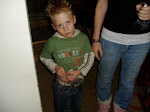I thought it best to start a new blog just for this topic. Why not. There is so much to say on it. The previous post is the same as the one on my other blog, just to keep a record.
This should be fun and I look forward to posting everything that happens to me and Caleb.
thanks all.
Sunday, February 8, 2009
Dyspraxia.... My child has.....
I thought it would be worthwhile posting a serious topic, and this is a very serious topic. It's a topic that I try to avoid because it takes up alot of my energy and when I type I like to not think about it - if you know what I mean.
My 7 yr old son was diagnosed with dyspraxia when he was 3, and this came about because he couldn't talk. He also did not crawl until he was 15mths and he was walking near 2 years old, which is not good. This disorder could be from his premature birth (and thats a whole other topic) or from having viral meningitis at 8 weeks old, from which he had seizures and stopped breathing 3 times.
Anyway, dyspraxia is difficult to explain as it is extremely complex, but I will give it a shot. Dyspraxia is neurologically based, it is not an illness or disease from which you can recover. It is not a unitary disorder, which means there are a specific set of symptons common to each case. With dyspraxia each child is affected in different ways and to different degrees.
Dyspraxia is a disorder of Praxis, where somewhere between sensory information gathering and storing, ideation, motor planning, and execution, the messages are not getting through, and are not producing the right result. Maybe the information from the senses was not collected, transmitted, or sorted and stored properly, or even stored in the wrong place. Whatever is happening, Praxis is failing. Now it is inconsistently failing, sometimes some days the messages get through and hit the mark and the person actually gets whats happening and can perform the task, while the next day he may not remember how to get dressed or in my son's case he may forget where the pantry is. He is constantly needing to relearn tasks.My son has a very poor memory, and this is on top of his dyspraxia, so it doesn't help things, I can tell you.
I suppose I should explain Praxis. Praxis is the link between brain and behaviour, it allows us to make choices, to plan our lives and actions. With it we can function in our world, we dress ourselves, eat with a knife and fork, drink from a cup, write, type, talk, achieve tasks and goals.
First we need to have the idea of doing these things - this is called Ideation.
Second, we then plan how best to do them - Motor planning.
Third, then we perform the action to carry out the idea - Execution.
Yeah, so that is Praxis, the ability to organise our activities in new and creative ways. All of this happens in the blink of an eye, the speed of thought I should say. The brain is a wondrous thing.
My son's praxis is deficient. His wires are screwed, his connection is damaged. And there is no way of telling exactly how damaged he is inside. It is like having a loose wire on your blurry faulty tv and if you jostle it a certain way it works, but then it falls back to where it was making your tv reception shocking. Then you shift it or you have to hold it and then your tv works a little better - but it's never perfect.
Not to worry, there is a bright side for my son and others who suffer with it. It can be overcome to some degree. My son has been able to walk - for a time I was really worried he wouldn't know how to walk! but he did. He has learnt how to talk! a Miracle! he is starting to write and read a little. It does eventually happen that the child develops and can do things that other kids can do so easily.It has taken oodles of speech therapy, physiotherapy, and occupational therapy to help him, and that's still all ongoing. and added to that a physcologist to help me understand his memory problems.There is much to say on this, and maybe I will next time.
Caleb faces many challenges as do I, but he is so happy and he loves people. He is fearless despite not being able to talk properly. He doesn't care what people think about him, and thats something I love about him.
A terrible downside to this condition, is that suffers are trapped in their minds. They have ideas they want to talk about and carry out, yet they don't have the means to express themselves freely. He gets frustrated and angry, and often he gets aggressive because he cannot talk about what is going on in his head. He lacks self-control because it is a skill that needs to constantly be learnt, the same for everything else. He also gets mad because he says the wrong things eg. swearing, then its difficult for him to express remorse or regret.He can't speak spontaneously, and he can't have a fluent spontaneous conversation with you. He often says preprogrammed things eg. he repeats his sentences all the time, because he has 'learnt' that particular phrase or sentence. He will tell me again and again the same thing or he will ask me the same question over and over. Sometimes he will start a conversation or speak about a subject, and we will talk and I will ask him something about it, and he will look at me with puzzlement and say 'what are you talking about mummy?' AAAargh. He has forgotten what we were talking about! I have to laugh - alot. sometimes it's like talking with an insane person.Yes, it is frustrating for me too! thankfully, I am a patient person.
That's all very long. I will speak more on it another time. Hopefully that will shed a little flick of light on dyspraxia for anyone who has never heard of it before.
My 7 yr old son was diagnosed with dyspraxia when he was 3, and this came about because he couldn't talk. He also did not crawl until he was 15mths and he was walking near 2 years old, which is not good. This disorder could be from his premature birth (and thats a whole other topic) or from having viral meningitis at 8 weeks old, from which he had seizures and stopped breathing 3 times.
Anyway, dyspraxia is difficult to explain as it is extremely complex, but I will give it a shot. Dyspraxia is neurologically based, it is not an illness or disease from which you can recover. It is not a unitary disorder, which means there are a specific set of symptons common to each case. With dyspraxia each child is affected in different ways and to different degrees.
Dyspraxia is a disorder of Praxis, where somewhere between sensory information gathering and storing, ideation, motor planning, and execution, the messages are not getting through, and are not producing the right result. Maybe the information from the senses was not collected, transmitted, or sorted and stored properly, or even stored in the wrong place. Whatever is happening, Praxis is failing. Now it is inconsistently failing, sometimes some days the messages get through and hit the mark and the person actually gets whats happening and can perform the task, while the next day he may not remember how to get dressed or in my son's case he may forget where the pantry is. He is constantly needing to relearn tasks.My son has a very poor memory, and this is on top of his dyspraxia, so it doesn't help things, I can tell you.
I suppose I should explain Praxis. Praxis is the link between brain and behaviour, it allows us to make choices, to plan our lives and actions. With it we can function in our world, we dress ourselves, eat with a knife and fork, drink from a cup, write, type, talk, achieve tasks and goals.
First we need to have the idea of doing these things - this is called Ideation.
Second, we then plan how best to do them - Motor planning.
Third, then we perform the action to carry out the idea - Execution.
Yeah, so that is Praxis, the ability to organise our activities in new and creative ways. All of this happens in the blink of an eye, the speed of thought I should say. The brain is a wondrous thing.
My son's praxis is deficient. His wires are screwed, his connection is damaged. And there is no way of telling exactly how damaged he is inside. It is like having a loose wire on your blurry faulty tv and if you jostle it a certain way it works, but then it falls back to where it was making your tv reception shocking. Then you shift it or you have to hold it and then your tv works a little better - but it's never perfect.
Not to worry, there is a bright side for my son and others who suffer with it. It can be overcome to some degree. My son has been able to walk - for a time I was really worried he wouldn't know how to walk! but he did. He has learnt how to talk! a Miracle! he is starting to write and read a little. It does eventually happen that the child develops and can do things that other kids can do so easily.It has taken oodles of speech therapy, physiotherapy, and occupational therapy to help him, and that's still all ongoing. and added to that a physcologist to help me understand his memory problems.There is much to say on this, and maybe I will next time.
Caleb faces many challenges as do I, but he is so happy and he loves people. He is fearless despite not being able to talk properly. He doesn't care what people think about him, and thats something I love about him.
A terrible downside to this condition, is that suffers are trapped in their minds. They have ideas they want to talk about and carry out, yet they don't have the means to express themselves freely. He gets frustrated and angry, and often he gets aggressive because he cannot talk about what is going on in his head. He lacks self-control because it is a skill that needs to constantly be learnt, the same for everything else. He also gets mad because he says the wrong things eg. swearing, then its difficult for him to express remorse or regret.He can't speak spontaneously, and he can't have a fluent spontaneous conversation with you. He often says preprogrammed things eg. he repeats his sentences all the time, because he has 'learnt' that particular phrase or sentence. He will tell me again and again the same thing or he will ask me the same question over and over. Sometimes he will start a conversation or speak about a subject, and we will talk and I will ask him something about it, and he will look at me with puzzlement and say 'what are you talking about mummy?' AAAargh. He has forgotten what we were talking about! I have to laugh - alot. sometimes it's like talking with an insane person.Yes, it is frustrating for me too! thankfully, I am a patient person.
That's all very long. I will speak more on it another time. Hopefully that will shed a little flick of light on dyspraxia for anyone who has never heard of it before.
Subscribe to:
Comments (Atom)


